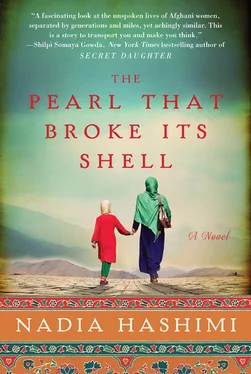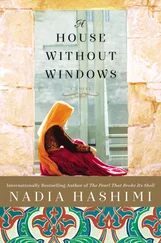“He hasn’t been too much trouble, has he?” I asked, knowing what her answer would be.
“Oh, he’s getting sweeter every day, Rahima. Tomorrow we should espand him, to keep the evil eye away. Before you know it, he’s going to be talking his mouth off. You should see him trying.”
“Have you seen Badriya today?” I asked, wanting to talk to someone about what I’d observed.
“No, are you looking for her?” She was feeding morsels of tea-soaked bread into Jahangir’s open mouth.
“I saw her this morning, outside behind the house. She looks like her arm’s pretty badly hurt. And she’s not walking right.”
“Hm. Did you ask her about it?” Jameela said, shaking her head.
“Yes, but she brushed me off.”
“She expected too much.” Jameela sighed. “A man has to feel that he’s in charge of his home, at the end of the day. Especially a man like Abdul Khaliq Khan.”
“What are you talking about?”
“You know it’s not easy for him to agree to have her run for election. Her name has to be publicized in the area for people to vote for her; she will be talked about. And it will be big news that the powerful Abdul Khaliq’s wife is out of the house, running for parliament. It’s not what he wants.”
I felt stupid for not figuring this out on my own.
“Last night, I heard him.”
“What happened?”
“He warned her not to turn into one of those women, the kind who make a lot of noise, talk with lots of people. He wanted her to know that it was his decision to put her into the election and that it had nothing to do with her. I think he’s heard her talking about it. That’s not what he wants of his wives. I don’t know what exactly she said but he was rough on her last night.” Jameela shook her head and clucked her tongue. “It sounded like he was at his worst.”
As much as her smugness had irritated me, I pitied Badriya. We all knew Abdul Khaliq’s heavy hand. I wondered if Badriya regretted being chosen to run for the jirga seat.
“Is he still going to go through with it? I mean, to have her run for the parliament?”
“I think so. He wants the power. Through her, he would have his finger in a lot of different projects. He’s not going to give that up, as much as he might hate to have his wife’s name written on ballots and know that she’s going to have to be away from the house sometimes to fulfill her duties. I’m sure he’s trying to think of a way around all that anyway.”
Abdul Khaliq had indeed taught Badriya a lesson. She didn’t talk about the upcoming election after that. He met with her from time to time as well as his advisers. I caught bits and pieces of conversations. Things weren’t going well. His advisers weren’t sure Badriya would win the seat in the jirga but Abdul Khaliq had a way of convincing them.
My husband was used to getting his way. If he wanted Badriya elected, she would be.
Abdul Khaliq and Badriya traveled to Kabul frequently. He hated it. She claimed to enjoy it but we could see that she didn’t. Abdul Khaliq was always tense before they left and even worse by the time they returned.
Badriya had won the election, mostly thanks to the women’s votes, according to local news. To me and my husband’s two other wives, it seemed unreal that something as important sounding as the parliament would let women vote. Khala Shaima had come by again. I asked her about my family and Bibi Shekiba. She asked me about Badriya and Abdul Khaliq. By this time, my naïveté had been washed away. I knew just what kind of man I was married to and I knew he had done terrible things to people. Jahangir, my son, was starting to look like his father, which frightened me. Sometimes I worried I might grow to dislike him if he did. I cringed when he became angry or frustrated, his shrieks taking on a familiar hostility. But his moods were nothing in comparison to his father’s and he was otherwise very loving and affectionate, pulling my face to his and patting my head as if I were the child and he the parent.
Khala Shaima’s breathing was more labored today. It could have been the dust in the air, her waning health or my own paranoia. She was the only family that I had left and I often worried about what I would do without her visits. I prayed for her health selfishly.
“He’s telling her exactly how to vote. She’s got no choice but to follow his orders.”
I nodded. “You should see how exhausted she looks every time they return from Kabul. She looks completely drained.”
“But there must be some way, some way for her to vote on her own. He doesn’t go into the parliament, you know. Once she’s in a session, he’s not there to sway her.”
“I’m sure he’s got ways of knowing or watching every little thing that happens behind those doors.” I pried Jahangir’s small hand open and took away the stone he had found. He had watched his older half brothers playing and now wanted to imitate them. His round eyes lit up when he saw them, his mouth broke into a wide grin and he would pull my face and point for me to look at what he was seeing.
“Yes, bachem, I see them. You’re going to grow up to be just as big and strong. Just wait.” Sometimes I tried to imagine what he would look like in ten years but my mind couldn’t envision him as anything but the sweet toddler he was. When I tried to picture myself in ten years it was frightening. My hands were already rough and knobby. My back ached at night, partly from carrying Jahangir for nine months and partly from being bent over to wash clothes and scrub floors most days. This home, this life, had aged me. Maybe that was what Parwin had seen, life in ten years. Maybe it was a sight too ugly to bear.
Everyone needs an escape.
“Maybe you can go to Kabul with her,” Khala Shaima suggested. She started to cough, a rough cough that rattled her whole body. I put my hand over hers and pushed a glass of water closer to her. “Thank you, dokhtar-jan . Bah! The dust is irritating me more than usual today.”
I hoped that was all it was.
“Anyway, what was I saying? Yes, why don’t you see if you can go to Kabul with her?”
“What am I going to do in Kabul, Khala- jan ?”
“Who knows,” she said vaguely. “But in Kabul you’ll see different things. It’s an education of sorts. See how people live there, see the buildings and see what the parliament is doing. It’s an opportunity for you.”
The idea was tempting. I wouldn’t have minded seeing what the big city of Kabul looked like. I’d only heard about it through the story of Bibi Shekiba, which I hoped Khala Shaima would continue today. It was as if she read my mind.
“I know you enjoy hearing about your bibi Shekiba. She lived in Kabul, you know. It’s a different life there.”
“But you’ve never seen it, have you?”
“Look at me, Rahima! I’m thankful my ragged bones bring me this far. When I was younger, though…” Her voice softened. “I did dream of going to Kabul. I wished a carriage would come down the road, pick me up and take me to see the presidential palace and the shops and the streets and the airport. I wanted to see all the places I had read about.”
That was her escape, I realized. Where her body couldn’t take her, her mind went.
“Maybe you could go now?” I suggested. The yearning in her voice made me wish she could go.
“My time has passed. But think about it. Badriya is going back and forth between here and the city. It shouldn’t be a big deal for her to take you along. Offer to help her.”
“Help? The only help she needs of me is right here, washing, scrubbing, ironing, rubbing her back even…” The list went on and on.
Читать дальше












